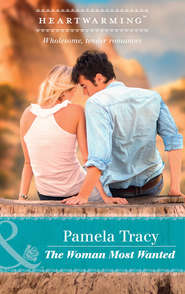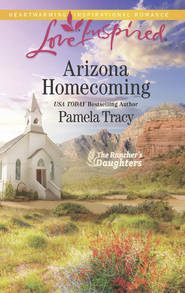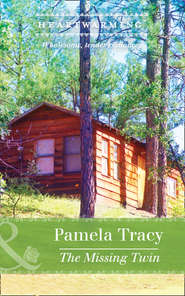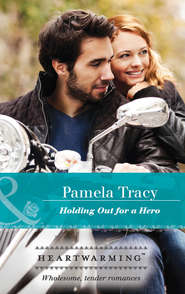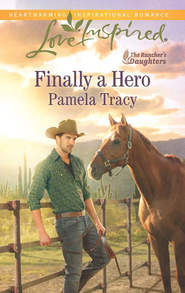По всем вопросам обращайтесь на: info@litportal.ru
(©) 2003-2024.
✖
Small-Town Secrets
Автор
Год написания книги
2019
Настройки чтения
Размер шрифта
Высота строк
Поля
“Yolanda.”
Startled, Yolanda blinked, realizing that she’d followed Adam to the front porch and had just stopped, afraid to go back in the house but unsure what to do next.
“I’m fine.”
He shook his head. “No, you’re not.”
Yolanda started to protest, but stopped. Adam, of all people, could read people’s moods. He’d been doing it his whole life, watching out for his disabled brother by diffusing emotional situations before they got out of hand.
“You’re right,” she admitted, “for some reason, I’m overreacting.”
“Not like you,” he admitted. “How can I help?”
It felt strange to accept help from him. She and Adam were usually adversaries—she promoting the side of logic; he on the side of risk.
She glanced back at the house, almost asking him to walk around with her again. Help her figure out where the woman had gone, how she’d disappeared. He’d do it, she knew. He would never walk away from someone who needed him.
“Nothing right now,” she finally said. “I’ll figure it out.”
He nodded, not looking convinced, and he took a couple of steps down the front stairs.
She didn’t want him to go.
“Adam, why’d you come home?”
He raised an eyebrow, clearly surprised by the question. “Haven’t you heard? I came back to help my parents.”
Yolanda knew that his dad had hurt his back while teaching a Tae Kwon Do class, and that the doctor had found something suspicious in the X-ray. But Adam’s parents were young. Probably in their fifties.
Her mother had been young, too, even though Yolanda had been a change-of-life baby, a complete surprise, born when her mother was forty-six. She’d passed away at seventy-one, too young. Yolanda still wanted her mother. And Gramma Rosi was eighty-six. Maybe eighty-seven. No one was quite sure.
“I heard that but didn’t realize your father was so sick that you had to give up your career.”
“Sometimes family comes first.”
No, Yolanda thought. Family always comes first.
But she didn’t buy that his father’s illness was the only thing that had brought Adam home. Something had to have happened, something that had stymied his paintbrush, filled his eyes with sadness and erased the smile from his face.
Yolanda didn’t know what, but right now she was glad he was here because his over-six-foot frame made her feel protected. She rather liked the sensation. The old woman must have really spooked her, enough so that she walked to the edge of the steps, closer to him. Funny, she’d never realized just how tall he was.
“I’ve got a class to teach,” he reminded her, but he didn’t leave. The street in front of her wasn’t busy. It was a small-town kind of Monday, paced for the beginning of the week. Tuesday and Wednesday would see more people out and about. By Thursday the out-of-towners would arrive not only to enjoy the wildlife habitat but also to stay at the many ranches that catered to weekend cowboys.
It was Yolanda’s town. The Acuras had arrived here just after the Moores and Ventimiglias. She liked the close-knit Scorpion Ridge community, quaint downtown and the feeling of a rich history that came with it. Adam had always been meant for bigger and better things, however.
He stood for a moment, watching her. “If you’re really afraid, you can always come to the studio with me. I doubt your ghost will be signed up for a beginner’s class.”
“She wasn’t a ghost. Ghosts don’t smoke.” Yolanda stepped around him and settled in one of the two rocking chairs on the front porch and studied her surroundings. Across the street, a young woman pushed a stroller. The woman’s husband worked at a nearby mine. Maybe someday she’d come in for a romance novel for her and a picture book for the baby. Another neighbor raked his yard. A car—Yolanda recognized it as belonging to the minister—traveled down the street and turned right.
Nothing was out of place or suspicious.
“She’s gone,” Yolanda muttered.
“Who’s gone?”
Yolanda started at the new voice. “Gramma Rosi, where’d you come from?”
“I was sitting in the backyard on the swing, enjoying the garden. I thought it was time to come in.”
Rosi Acura still owned the house, still had a key. She could visit whenever she wanted...and apparently leave doors unlocked so people could wander in off the street.
Right now she called a lot of shots in Yolanda’s life. Her biggest stipulation: “Even though I’m giving you the house, I still want things in my name. I’ll pay the gas and water and such. All the taxes.”
When Yolanda protested, Gramma Rosi merely scoffed and added her two cents to Yolanda’s mom’s wish that her daughter live her dream. “In the world today there are people who love what they do and people who don’t know how to love. You are a lot like your mother, but you don’t have to live like she did. All my life I worried about that girl.”
“Hello, Mrs. Acura,” Adam said. He took two steps down the front stairs, apparently feeling it was okay to leave now that Yolanda wasn’t alone.
“Adam, I love what you’ve done to the floorboards. They look like they did when my family first moved in.”
“When was that, Mrs. Acura?”
“Nineteen hundred and forty-six... maybe earlier, or later. I had just turned sixteen. Until now, it’s always been a private residence.” Gramma Rosi gazed up at the house, all smiles, something in her eyes that Yolanda didn’t understand.
“It’s still somewhat a private residence,” Yolanda reminded her. “I’m living upstairs, remember.”
Maybe Scorpion Ridge was too small a town for a used bookstore... That had been her aunt Freda’s comment. Rosi’s second daughter. Yolanda had always thought it magical that her grandmother had had two families. First, she’d had Trina. Then, when Trina was grown and gone, she’d had two more children.
“They kept me young,” Gramma Rosi claimed. “Also, it made it so much easier to lie about my age.” Freda had moved to California the day after her college graduation. They saw her maybe once every three years.
You’ll have to take care of your own insurance, both life and medical... That had been her uncle Juan’s contribution. He was Gramma’s youngest child.
He lived life to the fullest, always had, yet seemed to land on his feet and make good decisions. Yolanda, on the other hand, needed prodding to take risks and sometimes took so long deciding which course to take that she missed out on opportunities.
But Rosi had made the decision to open the bookstore easy by giving Yolanda her house. “You, more than Freda or Juan, deserve the house. Take it now while I can enjoy watching what you do with it.”
True, Freda was in California. She didn’t want it. Juan lived in Phoenix in a gated community, complete with wife and children and all their activities, although he did love to come visit.
Grandma had another stipulation. “And I’ll work for you. You don’t even have to pay me.”
Just what Yolanda needed. Gramma Rosi would give away books if the customer didn’t have enough money, or worse, she would lend him the money. And if a book that had questionable content—maybe it was a bit too sensual—wound up on her counter, she’d accidentally misplace it. Even if a buyer was right in front of her.
But her immediate concern was the mysterious older woman. “Gramma, did anyone leave out the back door while you were sitting in the backyard swing?”
“No, why?”
“I found an elderly woman in the history section. She said she was searching for a book. I turned away for a moment and when I looked back, she was gone.”
“It was someone you didn’t know?”






